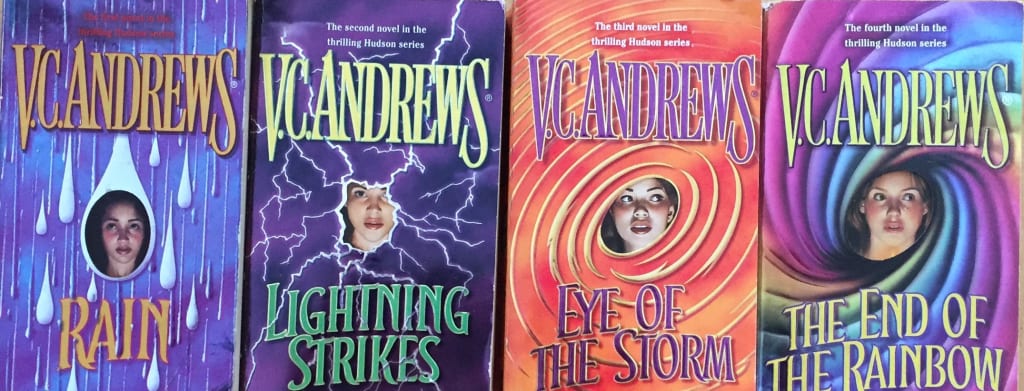Reading my Mother-In-Law: Virginia Andrews 'Rain'
A Novel Review

Recently, when discussing books with my mother-in-law, she paused the conversation to go foraging in her cupboard and then re-emerged with arms brimming with paperbacks. What she cradled was a new, ten-book collection of untouched Virginia Andrews novels – an author I was previously unaware of but one whom she adored – and insisted that I be the first to read them. Reading books is a highly personal experience and by sharing our favourite novels with others, we are essentially allowing them insight into our minds. It can be a great bonding experience, helping us understand those we love on a deeper level. This is what inspired me to start a ‘Reading my Family’ series that will see me read and review novels as recommended by my family members, beginning with my mother-in-law and Virginia Andrews.
‘Rain’ – the first installment in Andrews’ Hudson family series – tells the story of Rain Arnold, a teenage girl maneuvering her way through world of violence, secrets, loss and discrimination as she fights to forge a home for herself after a lifetime of displacement and upheaval. When I read the blurb, I was immediately concerned with how an upper-class, white writer might tackle life in the ghettos of Washington D.C. but had hoped to be pleasantly surprised. I intend not to speak on behalf of women of colour but, from my perspective, the representation isn’t quite there. Unfortunately, it feels as though Rain is there to serve as a literary device rather than to shed light on issues faced by people of colour. Andrews is strenuous in her attempt to distance the Arnold family from their community to the point where, at times, she appears more critical than empathetic. For example, Leticia Arnold prides herself on not accepting welfare, portraying it as a negative thing although seeking that help would have ensured a more comfortable life for her family. It seems to establish the author's distinction between ‘deserving’ and ‘undeserving poor’ in a way that is almost Victorian.
Even more strenuous is her attempt to distance Rain further from her community, social group and even family, presenting her as a character that is ‘not like other girls’. Such a trope is certainly of its time, but it is one that has aged badly as it upholds the belief that in order to be valued as a girl, you must renounce or reject certain traits that connect you to others of the same gender. You must be innocent, unknowingly beautiful and highly intelligent, leaving little room for any genuine personality to flourish. That is undoubtedly the case with Rain, as she is ultimately stripped down to a point where you care little for her as a protagonist. Furthermore, her appearance is used to the same avail. Andrews sews the seeds that bloom with the revelation of Rain’s true heritage early on. Although necessary for the novel’s advancement, the clues dropped by Andrews are done so in a way that leaves a bad taste in the mouth. Rain is introduced as racially ambiguous, whitewashing her with qualities that adhere more to outdated beauty standards e.g. lighter skin, straight nose, straight hair. These qualities are used to further alienate Rain within her community, but rather elevate her by bestowing her with qualities nearing an archaic picture of perfection. Ultimately, Rain’s non-biological sister Beni proves to be a more interesting and dynamic character, but unfortunately is given little room to grow before being discarded. Her relationship with Rain is the most authentic; the sisterly devotion and tenderness that transcends feelings of jealousy, resentment and guilt makes for a relationship that is both raw and believable. She is a turbulent character that begged to be dissected further, so it is disappointing that she was reduced to nothing more than a plot device, providing an easy passage to the next half of the story, just as her mother was towards the latter end of the novel.
In terms of plot, the novel peaked within the first 140 pages. A lot is packed into this small section of the book; Andrews does not shy from hard hitting topics, particularly sexual assault, but doesn’t explore the effects of these assaults, making it feel as though they were featured predominantly for the shock value. Solidifying this, Roy’s pursuit of Rain is one such example of sexual assault, but it is not outwardly portrayed as such. Their relationship, despite being borderline incestuous, comes across more as a ‘forbidden romance’. Although they are not connected by blood, they were still raised together as siblings and Roy stands as a protective figure in Rain’s life that is abusing her trust by manipulating her feelings for him. It is important to remember that he had sexual feelings for his younger sister long before finding out that they weren’t blood relatives. Similarly, references to the political climate of the time are vague and lazily disregarded as the drunken ramblings of Rain’s alcoholic stepfather or are shied away from by the other characters. If the issues raised would have been unpicked beyond the surface, then the content in the first part of the book would have made for a deeper, more enriching novel alone than the full thing. Once Rain left her home and became a part of the Hudson family, I found that I was very uninterested in what happened next.
Despite its flaws, ‘Rain’ was an easy read. Andrews’ writing style is very much of a readerly nature, making for a swift and effortless progression through all 440 pages. Her attention to detail makes for vibrant settings that leap from the pages like pictures in a pop-up book. I’m unsure of where Rain’s story might take me next or how it could possibly take up a further three novels, but I’m intrigued regardless.
About the Creator
Tyler Turner
Music and film blogger. English and History student. South Park goth kid.
Like what I do? You help me continue doing what I love most by supporting me on ko-fi.com/tylerturner






Comments
There are no comments for this story
Be the first to respond and start the conversation.